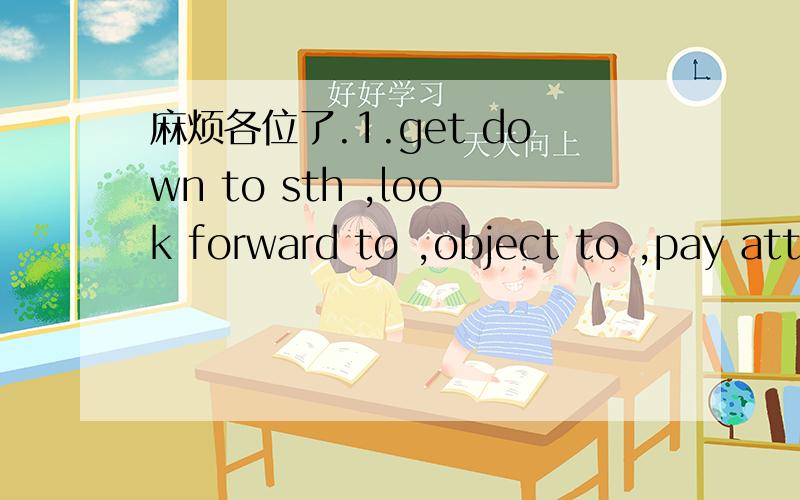麻烦各位了.1.get down to sth ,look forward to ,object to ,pay attention to 等等后接sth、v-ing 时,to 为介词,那可不可以跟to do当状语?why?2.When asked how they were paying for their education,almost a third of the students said
来源:学生作业帮助网 编辑:作业帮 时间:2024/11/18 18:43:29

麻烦各位了.1.get down to sth ,look forward to ,object to ,pay attention to 等等后接sth、v-ing 时,to 为介词,那可不可以跟to do当状语?why?2.When asked how they were paying for their education,almost a third of the students said
麻烦各位了.
1.get down to sth ,look forward to ,object to ,pay attention to 等等后接sth、v-ing 时,to 为介词,那可不可以跟to do当状语?why?
2.When asked how they were paying for their education,almost a third of the students said …… 此处为何用asked 而不用being asked?
3.They stayed with me three weeks.me后为什么不加介词?
4.Try hard as he will,he…… "Try hard"是表语还是状语,为什么可提前?As he likes her much,he does get angry with her sometimes.这个句子为什么错?为什么一定要用Much though he likes her,he……?as/though不是可倒可不倒吗?
5.Alone in a deserted house,he was so busy with his research work that he felt anything but lonely.逗号前的是独立主格结构吗?省略那些东西?
6.There be no sth.sth是单还是复还是均可?意思一样么?
麻烦各位了.1.get down to sth ,look forward to ,object to ,pay attention to 等等后接sth、v-ing 时,to 为介词,那可不可以跟to do当状语?why?2.When asked how they were paying for their education,almost a third of the students said
to不是在每个时候都是介词的,有时侯也是不定式(to引导的句子)
第一个:get down to sth.是开始认真对待(考虑)所以不行.
第三个:object to后只能接名词或动名词,所以不可以.
第二个:look forward to后面只能接名词和动名词,所以不可以.
第四个:pay attention to 后只能接名词或v-ing,所以也不可以.
省略了主语.那如果加上主语,别看when就是一个间接引语拉!
with是介词.所以就不用介词拉.
其实try hard可以放在后面,只是强调.
因为你多了个does啊!
强调嘛!
省略主语.
均可.一样比如:there is no reason to do sth there is no enough time to do sth
1.都不可以,是固定的用法
2.此句为省略句,完整句应为When (they were) asked how they were paying for their education,almost a third of the students said。因为两句主语都是they所以前面省略了they were,不能只省略were
5.是。He was alone in a des...
全部展开
1.都不可以,是固定的用法
2.此句为省略句,完整句应为When (they were) asked how they were paying for their education,almost a third of the students said。因为两句主语都是they所以前面省略了they were,不能只省略were
5.是。He was alone in a deserted house and he was so busy with his research work that he felt anything but lonely
6.印象中是单数
收起
1 这些都是固定搭配,要背的。
2 学生们是当被问到时,而不是现在正在被问,因为后半句用了SAID,表示过去,而不是现在进行式。
3 这句是病句!至少是“3 weeks ago”。
4 这个是动词词组,可以提前。
如果你要将as放前面也可以,但是你要说“likes her so much”
5 是的。“When he was alone in……”
...
全部展开
1 这些都是固定搭配,要背的。
2 学生们是当被问到时,而不是现在正在被问,因为后半句用了SAID,表示过去,而不是现在进行式。
3 这句是病句!至少是“3 weeks ago”。
4 这个是动词词组,可以提前。
如果你要将as放前面也可以,但是你要说“likes her so much”
5 是的。“When he was alone in……”
6 均可。意思也是一样的。
收起
1是固定的用法的啊
2前后句的主语是一样的,而且也不应该是being,省略的是they are
3有时候口语里会有这种句子的,貌似我也看到过的,口语里会出现有很多你难以理解的句子的,口语就是为了方便,越简单越好的
4try hard不是连起来分析的,其实你看一般的形式就好了he will try hard,这种的你应该看得懂的把,提前可能是因为后面有句子,所以就用这种形式的...
全部展开
1是固定的用法的啊
2前后句的主语是一样的,而且也不应该是being,省略的是they are
3有时候口语里会有这种句子的,貌似我也看到过的,口语里会出现有很多你难以理解的句子的,口语就是为了方便,越简单越好的
4try hard不是连起来分析的,其实你看一般的形式就好了he will try hard,这种的你应该看得懂的把,提前可能是因为后面有句子,所以就用这种形式的
对于后面的那个句子,这种题型是固定的用法,
5是的把。化成一般的形式就好了
6单数把,这个我也不是很清楚的啊
收起